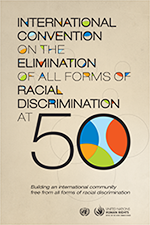An Interview with Simon-Pierre
Escudero, Founder of
Asociación Tierra de
Jóvenes in El Salvador
The IIMA Human Rights Office conducted an interview
with Mr. Simon-Pierre Escudero, founder of Asociación
de Tierra de Jóvenes in El Salvador. On September 22nd, Mr.
Escudero sat on the Panel Discussion on Youth and Human Rights during the 33rd
session of the Human Rights Council. Tierra
de Jóvenes was founded in February of 2014 to protect the rights of street
children and youth ages 4-25 in El Salvador. Gang activity in this country is
particularly pervasive and street children are most often the victims of
recruitment. To address the cycles of violence that are present amongst this vulnerable
population, Tierra de Jóvenes works
to bring street children’s concerns to the forefront of governmental and
international conversations. Tierra de
Jóvenes connects street children with medical, social and administrative
assistance. However, more than anything, Tierra
de Jóvenes focuses on building friendships with these children and youth
and provides a listening ear when one is needed.
As a former intern of the IIMA Human Rights Office and
being 25 years of age, we asked Mr. Escudero to share the story of his personal
empowerment and how this led to the launch of Asociación de Tierra de Jóvenes.
IIMA: In few
words, how would you describe the work of Tierra
de Jóvenes?
 Simon-Pierre Escudero: The clear goal of
our association is not just the protection, but also the promotion of the
rights of children working and living on the street. We promote their rights to
influence governments and the United Nations. We speak of these children so
they may exist and we try to change society through the mechanism of the United
Nations. I can work as an educator, but I would only change the reality of one
child. Why are these children here? There are very global phenomena behind that
question and these phenomena can be changed here in the United Nations.
Simon-Pierre Escudero: The clear goal of
our association is not just the protection, but also the promotion of the
rights of children working and living on the street. We promote their rights to
influence governments and the United Nations. We speak of these children so
they may exist and we try to change society through the mechanism of the United
Nations. I can work as an educator, but I would only change the reality of one
child. Why are these children here? There are very global phenomena behind that
question and these phenomena can be changed here in the United Nations.
IIMA: How did you
have the idea to start Tierra de Jóvenes
and why is it bear that name?
SPE: First, the idea of the street child caught my
attention. Probably because my father had been a street child in France…Second,
I am French, but I have a Spanish surname. It is assumed that my grandfather or
great-grandfather came to France during the civil war in Spain. You could say
that I am a “mix between a family destroyed by migration and a super-cohesive
family from the country.” My mom is a country woman and my dad is a city man
and street child. That gave me good roots and, at the same time, made me ask
"why are there so many problems in the world?" My last name
(Escudero) brought me to visit Spain, and after Spain I came to Latin America,
a place that fascinated me.









